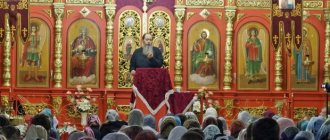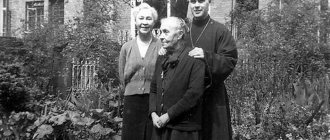The spiritual necessity of the prayer rule
According to the teachings of the Orthodox Church, reading morning and evening prayers has an important influence on the soul of a Christian. In spiritual terms, prayer rules are designed to move a person away from night dreams and daytime worries. Regular prayers should tune a person to the desired spiritual “wave”. Otherwise, he will not be able to establish a connection with the Lord. The Holy Fathers say that with the help of the grace of the Holy Spirit, the believer is brought into the necessary state of repentance. Through prayer, and prayer before bed is no exception, a person receives inner peace and tranquility.
Evil spirits are driven away from a Christian, as stated in the Gospel of Matthew (17:21):
“This race is driven out only by prayer and fasting.”
The prayers included in the daily rule were written by generally recognized church authorities. Among them are Saints Basil the Great and John Chrysostom, Saint Macarius the Great and others.
Prayer for the night
Compliance with the rules is the key to discipline
Success in any business requires diligence and consistency. This also applies to spiritual life. With constant work in prayer, Christians receive gracious help from the Lord. Therefore, the Holy Fathers do not advise making “stops” in the feat of prayer. For this reason, morning and evening rules were established.
“Rule! What an accurate name, borrowed from the very effect produced on a person by prayers called the rule! The prayer rule guides the soul correctly and holy, teaches it to worship God in Spirit and Truth (Gospel of John, 4:23). Meanwhile, the soul, left to itself, could not follow the correct path of prayer. Due to her damage and darkening by sin, she would constantly be seduced to the sides, often into the abyss, now into absent-mindedness, now into daydreaming, now into various empty and deceptive ghosts of high prayerful states, created by her vanity and voluptuousness.
Prayer rules keep the person praying in a saving disposition, humility and repentance, teaching him constant self-condemnation, feeding him with tenderness, strengthening him with hope in the All-Good and All-Merciful God, delighting him with the peace of Christ, love for God and for his neighbors" (St. Ignatius Brianchaninov, 1807-1867) .
The difference between a monk and a layman
The path of a layman and a monk are two different paths of human life, with differences in lifestyle, care and prayerful improvement. Monks not connected by close family and marital ties do not know the hassle associated with caring for loved ones, their minds are not occupied with numerous worldly problems, they do not feel the lack of time that a working person absolutely lacks.
Each monk has a personal confessor who monitors his spiritual development and instructs him in prayer practices.
Monks live in their own world, dependent on a certain discipline, with a clear hierarchy of subordination and a daily routine that allows them to pray at different times of the day.
That is why most of the works of the holy fathers, telling about the rules of prayer, were addressed to monks, based on their special rhythm of life in monasteries.
St. Ignatius Brianchaninov writes: “Monks are those Christians who leave all earthly pursuits as far as possible to practice prayer - a virtue higher than all virtues, in order to unite through it with God...”
Prayer before bed: various traditions
Each Local Church has its own established traditions of morning and evening prayer rules for believers. For example, in the Greek Church the following order is established for the laity. Before going to bed, the abbreviated Compline with some elements of Vespers is read. The morning rule is composed of the prayers of the Midnight Office and Matins.
In the Russian Orthodox Church, the morning and evening rules are different from church services. The finally established norm of prayers for the laity, used now, appeared in the 18-19th century. But often Orthodox Christians have a question: is it possible to change these prayer rules? Saint Ignatius Brianchaninov gave the following advice to believers:
“Choose for yourself a rule that corresponds to your strengths. What the Lord said about the Sabbath, that it is for man, and not man for it (Gospel of Mark, 2:27), can and should be applied to all pious deeds, as well as to the prayer rule. The prayer rule is for the person, not the person for the rule. It should contribute to a person’s achievement of spiritual success, and not serve as an inconvenient burden (onerous duty), crushing bodily strength and confusing the soul. Moreover, it should not serve as a reason for proud and harmful conceit, for harmful condemnation of loved ones and humiliation of others.”
When to read the evening rule
The very name of the prayer rule - evening - indicates that believers should pray to the Lord in the evening. However, this does not mean that it must be read immediately before bed. For example, abbot Nikon Vorobyov says that evening prayers can be read at a time convenient for everyone. It could be 6, 7, 8 pm. To do this, the prayer rule must be divided into two stages. First, read before the prayer of St. John of Damascus, “Lord, Lover of Mankind...” That is, end with the prayer, “Lord Jesus Christ, Son of God... have mercy on us. Amen". Afterwards you can do household chores, spend time with your family, and drink tea.
Immediately before going to bed, you should continue reading the evening prayers with “Lord, Lover of Mankind...”. When reading the prayer “May God rise again,” a believer can cross not only his bed, but also his home on all four sides. This is a visible sign that he asks God to protect him and his family from all evil. With the words of the prayer “In Thy hands, O Lord...” one asks for the Lord’s blessing for a night’s rest after the day’s worries. Thus, a Christian entrusts his soul into the hands of the Creator.
Having said their prayers for the night, the Orthodox no longer eat anything, but go to bed.
Prayer before bed - power and meaning
Prayer before bed should not be perceived as a magic spell, thanks to which, for example, nightmares will not be tormented at night. The evening rule is not a ritual. Prayer for Orthodox Christians is like armor for a warrior who is about to go to fight the enemy. With the help of prayer, believers gain the necessary spiritual strength.
Saint John Chrysostom spoke about the power of night prayer:
“When we remain in prayer, the power and authority of the evil one does not act on us; when we stop praying, the enemy overcomes us.”
Night for sleep
There are lines in one of the letters of St. Ambrose of Optina that laymen do not need to devote the night to prayer: “You ask how to accustom your pet to serious activities... First suggest that they make day out of day and night out of night; and when you succeed in this, then you can think about something else.”
The body of a working person, tired during the day, needs to restore strength through continuous sleep, and night prayers certainly break it into segments of imaginary wakefulness and possible relaxation.
Blessed Theodoret of Cyrus Fr.
When leading an active lifestyle, a person must have a correct sleep schedule, and constant awakenings for night prayers can unbalance his psyche and cause irreparable harm.
Night prayer: how to read it correctly
The Orthodox Church teaches that prayers and prostrations should be performed slowly and with attention. There will be more benefit for a person’s soul, even if he reads fewer prayers. It is important to do this carefully, without getting distracted by other things.
Therefore, for a Christian, reading prayers should become a creative process. So, any prayer from the evening rule can become a prayer for the night. For example, the last prayer from the rule or a prayer to the heavenly patron.
Saint Theophan the Recluse considered the main thing in the prayer rule to be the fight against coldness of heart. He even advised trying to sometimes replace standard prayers. The goal here should be not to read the entire rule overnight. The saint recommended repeatedly returning to the place where thoughts were distracted to the side. Thus, achieving extremely focused attention on the words and meaning of the prayer itself. And let only the initial prayers be read in the 15-20 minutes required to read all the prayers for the night. But they will be “real”.
“Explore yourself, your time, your capabilities, your strengths. Balance your prayer rule with your life so that it is not a burden, but a joy. Because it is better to read fewer prayers, but with heartfelt attention, than to read a lot, but thoughtlessly, mechanically. Prayer has power when you listen and read it with your whole being. Then a life-giving spring of communication with God will flow in our hearts” (Priest Andrei Chizhenko).
Night prayer. Benefits and dangers. Pestov N. E.
“This is the night of the Lord's vigil.” Ex. 12:42 Evangelist Luke writes about the Lord: “In those days He went up to the mountain to pray and spent the whole night in prayer to God” (Luke 6:12). So, the example of night prayer was given to us by the Lord Himself. The apostles also prayed at night.
The Apostle Paul writes about his way of life: “in labors, and vigils, and fasts”; “often in watching, in hunger, and in thirst” (2 Cor. 6:5; 11, 27). In letters to Timothy, St. Paul characterizes the Christian widow this way: “The true widow and the lonely one trusts in God and continues in supplications and prayers day and night” (1 Tim. 5:5).
The custom of praying at night was widespread among the first Christians. They gathered for night prayer together and devoted most of the night to it. Echoes of these prayer vigils have been preserved in our current worship services. At Matins , before the Great Doxology, the priest exclaims: “Glory to Thee, who showed us the light.” In ancient times, this corresponded to the moment when, after night prayer, Christians greeted the morning dawn and the first rays of the sun.
The rite of worship includes the Midnight Office, which is supposed to be celebrated at midnight. Night prayer is one of the features that distinguishes monastic life from the life of the laity. Night prayer is typical for many ascetics in Christ. Night prayer (or before the morning) of St. the fathers attach special importance, considering it one of the most powerful means for cleansing and enlightening the soul.
St. Isaac the Syrian writes: “Do not think, man, that in all monastic work there is any activity more important than night vigil. Every night prayer is more beneficial to you than all your daily feats. At night, the mind soars for a short time, as if on wings, and ascends to the delight of God; it will soon come to His glory and, due to its mobility and lightness, floats in knowledge that exceeds human thought.
Therefore, choose for yourself a delightful work - unceasing vigil at night, during which all the fathers put off the old man and were granted renewal of mind. During these hours, the soul feels immortal life, and by the sensation of it it strips off sinful garments and receives the Holy Spirit into itself. The spiritual light from night prayer generates joy during the day.”
Holy laywoman Juliania Lazarevskaya, wife of the Murom governor and mother of 13 children , got up for night prayer even when she was sick, gathering her last strength for her. Etc. Seraphim advised many of the laity who belonged to him to get up for prayer at night.
Why is it necessary to pray at night? Doesn't this contradict the laws of nature, which sleeps and rests at this time? And doesn’t the person himself require rest after a hard day and won’t he quickly weaken if he is deprived of the necessary sleep at night? To clarify, let’s ask ourselves: is the medicine good for the body? Of course not for the healthy, but for the sick it returns health. But we are all mentally ill, very seriously ill, and our soul requires intensive and long-term treatment.
The surest of medicines is prayer, and night prayer is the best and most effective form of this medicine. Why is this so? Let's not forget that we do not live alone in the world. We are connected, fused very closely with the world around us. This world oppresses our soul, clogs our brain with idle thoughts, our imagination with its images, our will with its impulses, and infects our heart with its passions and addictions.
The world is shaking in the sieve of Satan (Luke 22:31) , and we are shaking along with the world. And most often we do not have the strength and ability to separate ourselves from the world during the day, in this whirlwind of vanity; our mind is occupied with worldly thoughts and our heart with worldly impressions and experiences. How many people can find an opportunity for solitude in the morning, afternoon and evening? And even if there is such an opportunity, then we can only protect ourselves from the sounds of the world, but not from fresh worldly impressions and memories and the nervous waves of the world raging around us.
Here there is a mutual influence of people, a kind of nervous “induction”, which strongly binds in the phenomena of hypnotism, suggestions at a distance, etc. All this suggests that the most accessible opportunity for the complete separation of our soul from the world seems to us at night or early in the morning, when the world is still sleeping and its waves of sounds, feelings and thoughts are not yet raging.
Fr. also speaks about some features of night time. John S: “At night our soul is free from the vanity of the world, and therefore the spiritual world can freely act on it, and it can freely receive its impressions, so that the thoughts and dispositions of a person’s heart are good thoughts and dispositions, if a person is righteous, and thoughts and vain and evil dispositions, if he is an unrepentant sinner.”
Prayer is a sacrament, the sacrament of the unity of the spirit with the Spirit of the Lord. This sacrament cannot be performed anywhere or anyhow. “Prayer is the food of the soul, and food must be taken in peace,” said one saint. father. Prayer is not reading out rules, often without perceiving thoughts not only with the heart, but also with the mind. Such a prayer differs from the true one in the same way as an image in a mirror differs from a living person.
For prayer, everything in a person must be prepared: the body is collected and vigorous, the will is directed towards God, the conscience is cleansed by repentance, the mind is freed from vanity, the heart is cleansed from passions and addictions. And when all the “traders” are expelled from the temple of the soul, the Holy Spirit enters it during prayer.
Anyone who has experience knows the difference between daytime and night (or early morning) prayer, when everyone and everything around is still asleep. At night, the mind easily concentrates and comprehends the full depth of the words of prayer, the heart begins to take part in it, and feelings that ennoble the heart arise and grow in it - poverty of spirit, humility, repentance, gratitude, love and tenderness.
Such prayer cleanses, nourishes, softens and calms the heart. A person leaves it refreshed, peaceful, spiritually strengthened, ready to overcome all the difficulties of the upcoming task. And if he stood up to pray alone, now he does not enter the life of the day alone - his soul is filled with the Holy Spirit.
What mainly distinguished the life of the first Christians from the life of modern ones? These are, first of all, constant night prayers and daily acceptance of the Body and Blood of Christ in the Sacrament of the Eucharist. This gave the ancient Christians a burning spirit and granted many of them those spiritual gifts that have been lost by modern times - the gift of prophecy, the special gift of “tongues” (1 Cor. 13:8), the gift of recognizing the will of the Holy Spirit (Acts 16:6).
All St. The fathers therefore unanimously say that vigil and daily night prayer are the necessary foundation of real spiritual life, which quickly and surely leads to the creation in the soul of a Christian of the temple of the Holy Spirit - the only legitimate goal of the life of every Christian
How can you practically approach solving this problem—training yourself to stay awake at night? Of course, different people with different situations in their lives will have different solutions. So, this can be achieved by shifting the start of night sleep to an earlier date with the earliest possible time of getting up. So, it’s good to go to bed at 9-10 o’clock, get up around 4-5 o’clock, and when possible and necessary, then sleep another 1-1.5 hours during the day.
Thus, prayer will be performed in the very early hours of the morning, when everyone and the household are still usually asleep. This early morning prayer will replace the night prayer.
Those who have the opportunity and sufficient strength can interrupt their night's sleep in the morning and get up for prayer, so that after finishing it they can give themselves a little more time to sleep and rest.
It should be noted that for those new to prayer and those who have not yet become spiritually strong, one should even prefer early morning prayer to night prayer. The latter can be more difficult.
According to laws incomprehensible to us, during the night (mainly from 12 to 2 am) the dark force has the greatest power over the world and sometimes interferes with prayer with various “insurances” (inducing feelings of fear, fear, horror, incomprehensible sounds, knocking and, finally, various phenomena and visions).
It may take effort, patience and perseverance to train yourself to get up very early. In life, nothing good is given for free; The path of a Christian is a narrow path, the path of vigilance, effort and sobriety.
But what a Christian receives from these efforts is immeasurably valuable - valuable because it comes into contact with eternity and paves the way to the spiritual treasures of the Kingdom of Heaven. “Be zealous for great gifts, and I will show you an even more excellent way,” says the Apostle Paul (1 Cor. 12:31).
Appendixes to chapters on prayer Prayer is an internal act of our spirit. It can be expressed in a variety of forms. Often, and even, perhaps, especially often, in our silence before God.
We are silent because God knows all the depth of our thoughts, all the aspirations of our heart, and we are not always able to express them in words. God understands the secret movements of our heart and responds to them.
I am a little afraid that you do not take into account exactly this, that is, what was said above; that you are inclined, like so many, to understand prayer as standing in front of icons and pronouncing centuries-old formulas (morning and evening prayers or psalms and the like).
Of course, you can get used to this form of prayer from childhood and perform it every day. But this is not at all enough, and such a prayer does not at all exhaust the question of prayer. I notice that modern people are becoming less and less capable of precisely this type of prayer. I explain this phenomenon by the intensification of people’s intellectual activity.
Our minds are in almost constant excitement from the multitude of impressions of all kinds that come to us during the day: “visible” and “audible”. In the morning, the inclusion of people in cities (and now in villages) in world life begins, involving our minds and ideas in the course of events and our feelings in complicity in them.
So, how can we achieve that peace of mind and zeal of the heart that is so necessary for prayer? Here's the question. We will return to it someday, if God deigns, but now I will move on to something else, to your particular case.
You say that, having noticed your inability to find prayer when you “stand for prayer,” you felt your insignificance in this. And this depresses you. Don't be discouraged. Don't worry too much about this. To appear before God does not at all mean “standing in front of icons,” but to feel Him in your deep consciousness as filling everything with Himself.
To live by God is to perceive Him as truly the First Reality, after which the world follows in the order of the lower, second, derivative created reality. Any body position can be suitable for this: lying, walking, sitting, standing, etc.
If your mind and heart experience a prayerful mood when reading the Holy Scriptures, then you remain in this until this prayerful mood ceases.
The rule is this: every word, every position in which the mind and heart are united in one life - the memory of God, should not be changed until the mind, or heart, or body gets tired. My observations of modern people lead me to the conclusion that it is most convenient for them to pray in churches, especially during the liturgy. Liturgical prayer with frequent communion - completeness. True, for this it is necessary to live and understand it.
Then it will be revealed that the liturgy embraces our entire life: it contains all the plans of our existence in its turning towards God. Liturgy, if only it is experienced with our whole being, allows us to live by it. It is truly a Divine act, containing not only this entire visible world, but also going immeasurably beyond its limits.
Without deepening his knowledge in this area, a person can easily fall into a habit that is deadening and devastating. It is necessary to continually grow in the knowledge of God and not allow the liturgy to turn into a detail of our pious life.
It was precisely because it became “poorer” instead of the liturgy that we all experienced a deep crisis. People began to turn to all kinds of reading or entertainment with great pleasure, preferring them to liturgy. They thus rested better and even satisfied their need to grow in their knowledge. This is completely understandable and justified. Man is by nature a being striving for perfection, for knowledge and even absolute knowledge and the fullness of being.
And here is the paradox: due to this striving for absolute perfection, inherent in human nature, people move away from that “place” that was given by God for the acquisition of knowledge and this life.
I will just say that, unfortunately, the forms of church life and worship that have been established for centuries do not quite meet the searches and needs of modern people. And this is understandable: these forms were not created by our eras, for people of a different intellectual and mental development, a different worldly experience...
But this issue is extremely complex in the Church, and therefore, for now, individual cases are resolved in this manner. Not receiving answers to all their needs in the church services of the temple, some people are forced to, at the cost of great effort and time, make up for this deficiency at home.
Bishop Ignatius (Brianchaninov) wrote a hundred years ago that in his time even monks, not receiving everything they needed in monasteries through personal guidance, should read a lot of Scripture and the works of St. fathers. Without this they could not prosper.
Moreover, we have to say all this for our contemporaries living in a world, moreover, in a world that does not pray and forgets about God. So, do not worry about your “inability to concentrate” when you “stand” for prayer. Maintain first of all the memory of God and peace of heart. The latter is especially important for you, since yours is not strong. Be careful not to uselessly strain the small strength of your body.
To find the right path, it is best to ask God for this in prayer: “Lord, You Yourself teach me everything... Give me the joy of knowing Your will and Your ways... Teach me to truly love You with all my being, as You commanded us... Organize my life just as You Yourself in Your eternal council thought about me... yes, even about me, for You have not forgotten anyone and have not created anyone for destruction...
I madly squandered the strength You gave me, but now, at the end of my life, You yourself will correct everything and teach me everything... But so that Your will is truly done in my life, whether I understand it or not until the time comes... Do not let me to walk in strange paths leading into darkness... But before I fall asleep in the sleep of death, let me, unworthy, see Your Light, O Light of the world..."
And so in your own words, pray about the same thing. Some time will pass, and the power of these words will penetrate the inside of your being, and then life will flow by itself exactly as the Lord wants.
But by externally reasoning, we will not solve anything. After all, the whole meaning of life is for our mind and heart to live in God; so that God becomes our life. This is all He is looking for. This is why we were created, to live His life, and, moreover, in all its infinity.
This word may frighten us when we see our present pitiful state, but it is so, and we should not lose this faith. One of the greatest dangers is to reduce and belittle God’s plan for man.
God knows all our suffering, even unjust suffering. He knows and has compassion for us. It is necessary to establish a “personal” relationship with Him: almost “human”. I hope you understand. You understand that by this I mean an internal, intimate connection with God. For the whole person is called to life in Him, that is, not only his highest ability of contemplation - “spirit”, but also feeling - “soul”, and even “body”.
How to pray? This question comes from the lips of almost all believers, and it is a terrifying testimony that their prayer does not testify to them what it should testify to itself: its truth.
And those who are not alien, if not to prayer, then to its sensations, feel the falsity of the external “departure” of relations towards their Creator, and that some force, binding them with external authority, pushes them onto the lifeless cold path of untrue standing before God...
The order of prayer (church) , of course, is also possible for personal prayers, and this order can result in the form of a rule, but a filial, free rule, under which a person forces himself (and this is essential given the deceitfulness of our body), but forces himself to pray , and not on the rule. The difference is very significant...
What a stone will fall from a person’s poor and weak conscience when he realizes that he is not “obligated” to anything, does not “have to” “read” anything before God. Let him pour out his heart before God as best he can... And childishly, simply, childishly trustingly and childishly humbly, he goes to his Heavenly Father, who appears to his human eyes in the Holy Mysteries...
An insane person thinks that after buzzing for one and a half to two hours in front of his ruler, he becomes worthy of tasting Immortality. Let him better work to say two true words to God and reflect these words on the spirit of his life and his thoughts...
The legalistic performance of external service, even now, after 1900 years of Christ’s Gospel, tries to obscure the true service of God... Because of the (unfulfilled) rule, they deprive themselves of the Cup. Eucharistic communion has left the body of believers...
But isn’t a liturgy conducted with a fiery, burning spirit for a priest a sufficient “rule for Communion”? We must remove all unbearable burdens that “our fathers could not bear” (Acts 15:10). We must free a person (his conscience) from “straining” external observances; we must turn his full attention to the glory of observing the spirit of Christ, to the bliss of being adopted as sons to God.
We must say clearly and openly: “So that your good deed should not be forced, but voluntary” (Phil. 14), “My son, give your heart to Me” (see Proverbs 23:26).
In the corner of your room, in the corner of your pillow, at the crossroads of your streets, give everything you can. And know that if you give everything (up to a thousand deaths), you will do nothing before the ocean of God’s grace. And you can give everything in one breath...
The abundance of infants in the faith, people who did not die to themselves (and to their deeds), and even who were completely alien to the spirit of the Gospel, but who considered themselves “believers,” legitimized, as it were, the rule for everyone. Souls that do not know how to connect themselves with God bind themselves to external matters of “duty” and “fulfillment.” But how, we will be asked, are the prayers of St. fathers, “scheduled” for this or that occasion of personal prayers?
What is: “Prayers of St. fathers"? Where are they? On paper? In the right place? In the right place is their dead shell! And prayer itself is at the Throne of God. Their shell was left to the Church as a mental guide, as an example of words emanating from a holy prayerful heart.
This shell was given to us so that we would know the nature of prayer pleasing to God and would set our hearts accordingly if we do not know what we should ask God for, if the Spirit has not yet interceded in us, for us.
And now we must pray either on our own - in accordance with these prayers of the Church, or read the words of these prayers, filling their lifeless shell with our spirit, our burning, our prayer. Without this content, other people’s words (even the Lord’s) will be chaff for our hearts and the Lord’s ears. They will return to us as skinny as we sent them to heaven...
Warm, like freshly baked bread, “breathing” (the expression of Fr. I. Sergiev) true prayer should be, no matter whether it is ours (in our outer words), or whether it is our mentor. The words of the book prayer book must become entirely our words.
They lie on the pages like dry wood. They need to be lit with your own fire, and then this fire will warm the soul and burn it out. Because whoever prays warmly, with tears, with love for God in the Spirit, it makes absolutely no difference to him: whether to speak, whether to remain silent with his tongue, whether to move his eyes along the lines, or not to see anything; whether to read God’s prayer, make it your own, or read your own, making it God’s…
The Holy Fathers teach simplicity of turning to God. One, glorified by God, said that a “believer” person is one who “speaks to God as to a person,” not in the freedom of his conversation, of course, but in the simplicity of an infant.
“Unless you are converted and become like children, you will not enter the Kingdom” of heavenly prayer... All life is the Rule of God - for man. A person must always be ready for the communion of the Holy Mysteries and for the exodus into another life. Every minute, in all his thoughts, feelings, moods, words, deeds, he must fulfill this Rule of Preparation. And bear all life's repentance only for failure to comply with this rule.
The thoughts outlined above are profound, and Vladika John’s denunciation of many of those Christians who do not understand the difference between external ritual and surrender of their hearts to God is just and severe.
The Bishop wants from all Christians depth, warmth, tears and even fire in prayer. But in our hearts it is so often cold and vain, and love for God takes place not in the heart, but more in the mind. We are accused of absent-mindedness in prayer, sins, coldness towards others, sins and negligence. But there is no need to be discouraged, much less despair, from the bishop’s denunciations. We recognize ourselves only as babes in Christ and poor in spirit.
Priest S. Shchukin writes : “The sectarians say to my parishioner: “Why do you light candles in the church? What good are they? And she has eight children, and she can’t find a time to not only concentrate, but even just to pray. And all it takes is enough to go to the temple on the way and light a candle there. In this way she truly gives the widow's two mites (Luke 21:2). And, surely, the Lord will praise her for this and set her up as an example to many.”
And we have (that is, it is in our power) only external spiritual labor, and fire in prayer is a gift of grace . To have ardent love, to burn in spirit, to control one’s thoughts and to have the gift of unceasing prayer - these are all great gifts of God’s grace, which can only be earned after many years of external labor for the Lord and “invisible warfare” in the soul of a Christian.
We only have the power to create that “external” for which the Lord also grants the “internal”. The entire experience of the Church suggests that Christians approached spiritual heights through external labors and exploits. “Give blood and receive spirit,” said the saints. fathers. They also argued that “prayer, albeit still cold, but forced, done with effort, with tension, is very pleasing to God.” But, while doing external things, let us remember the words of Vladyka John and let us not delude ourselves that we have already achieved something or are closer to love for God, to communion with God, or to the burning of the spirit.
We are still spiritually poor and, like the widow of the Gospel, we give to God only what we have - only our zeal in external things. Excerpts from the book “Prayer and Life” by Metropolitan Anthony (Blum-Sourozhsky), published in English. language in London in 1966 (Journal of Patr., 1967, Nos. 3, 4, 5 and 6)
“From the experience of human relationships, we all know that love and friendship are deepest when we can be silent together. If we need to talk to maintain contact, we must admit with confidence and sadness that the relationship is still superficial; So, if we want to offer prayer to God, we must first of all learn to experience the joy of silently being with Him .
It's easier than it may seem at first: it takes some time, trust and determination to start. Only with a feeling of fear, reverence for God, and the deepest reverence can we begin to take the risk of prayer, and we must grow to it in our outer life as fully and definitely as possible.
It is not enough to sit comfortably in a chair, saying: I begin to stand reverently before God. We must remember that if Christ were standing before us, we would behave differently, and we must learn to behave in the presence of the Lord as we would behave in the presence of the Lord who became visible to us .
First of all, this presupposes a certain state of mind, which is reflected in the state of the body... The modern world has largely lost the sense of prayer, and the discipline of the body has become something secondary in the minds of people, whereas it is far from secondary.
We forget that we are not a soul living in a body, but a human being consisting of body and soul, and that, according to the Apostle Paul, we are called to glorify God both in our bodies and in our souls; our bodies, like our souls, are called to the glory of the Kingdom of God (1 Cor. 6:20).
Approaching God is always a discovery of both the beauty of God and the distance that lies between Him and us. “Distance” is not a precise word, for it is not determined by the fact that God is Holy and we are sinners.
This distance is determined by the sinner’s relationship to God. We can approach God only if we do so with the consciousness that we are coming to judgment. If we come condemning ourselves; if we come because we love Him in spite of our own unfaithfulness; if we come to Him, loving Him more than the well-being in which He is not, then we are open to Him and He is open to us;
The Lord comes very close, in love and suffering . But if we stand before God in the armor of our pride, our self-confidence, if we stand before Him as if we have the right to it, if we stand and demand an answer from Him, then the distance separating the creation from the Creator becomes infinite...”
The author further writes that from constant presence in the presence of God, gratitude is born, mercilessness is born towards one’s own wickedness, the consciousness of the greatness of a person called in Christ to be a child of God is born, a sense of responsibility for this sonship that is constantly trampled upon by us is born, and the joy of becoming on the cross is born.
Conclusion.
Of all the great benefits of the Lord to man, the Christian faith and the gift of prayer are especially important for us .
With faith, the Lord gives Christians the greatest and incomprehensible gift of power, saying that “nothing will be impossible for you” (Matthew 17:20). The history of the Church fully confirms this. Christian petitions are always fulfilled in the fullness of faith. They were fulfilled even when they were of no use to Christians.
At the same time, the Lord often indicated (for example, through sleepy visions of saints) that requests were unreasonable, but at the insistence of a Christian, He still fulfilled these requests, true to His words: “Ask, and it will be given to you” (Matthew 7:7). Thus, the requests of mothers for the recovery of their children were often fulfilled, although subsequently the life of these children was a great misfortune for them and for their mothers.
So, let us not neglect this great gift of our omnipotence, devoting our strength first of all and most of all to prayer. But, knowing our weaknesses, passions and limitations of mind, we will always end all our petitions with the words of the Lord Himself: “Nevertheless, not as I will, but as You will” (Matthew 26:39).










